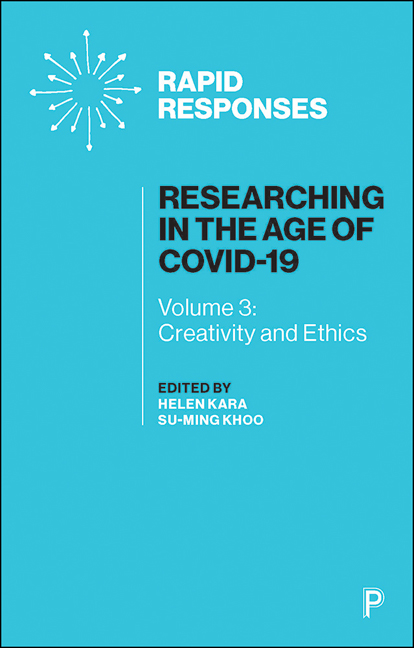8 - Transforming Culturally Relevant Research Amid a COVID-19 Pandemic
Published online by Cambridge University Press: 23 March 2021
Summary
COVID-19-related morbidity and mortality have disproportionately affected communities of colour across the United States. Originally dubbed the ‘great equalizer’, many individuals believed that COVID-19 affected everyone equally (Gupta, 2020). However, COVID-19 has exposed ethnic and racial differences in morbidity and mortality (Yaya et al, 2020). Early data showed that African Americans, Latinos and Native Americans were more likely to grow ill and die from COVID-19 than White Americans (Bassett et al, 2020). As data continues to emerge, it is evident that communities of colour bear a disproportionate burden of COVID-19. Thus, relevant COVID-19 data must be viewed as a foundation for conducting health disparities research.
Health disparities research identifies groups that receive inequitable access to care, treatment and resources (Chan et al, 2018). This research is necessary because it offers an in-depth understanding of the demographic framework (for example, race, ethnicity, gender, age, socioeconomic status, marital status and ability status) for addressing COVID-19 (Chan et al, 2018). Zastrow and Kirst-Ashman (2010) posited that academic researchers should encompass cultural competence and cultural sensitivity when investigating the behaviour and social environment of specific groups. See (2007) suggested that Eurocentric research may generate a misunderstanding of the issues that communities of colour face in light of COVID-19. Therefore, establishing multicultural and multidisciplinary research teams with an inherent understanding of health disparities is paramount to understanding communities of colour.
Since the onset of the COVID-19 global pandemic, academic researchers were forced to change approaches to research and building teams (Kupferschmidt, 2020). These rapid changes were driven by the infectivity of COVID-19 and the need to socially distance and isolate. Fortunately, technology, such as Cisco WebEx, enabled a newly created diverse research team to work without geographical constraints to facilitate COVID-19 research. The purpose of this chapter is to describe how a diverse research team worked together to conduct meaningful research regarding the impact of stress and coping in the age of COVID-19. Colleagues from the University of Nevada, Las Vegas (UNLV) and the University of Wisconsin, Madison led the development of a social mediadisseminated research project.
- Type
- Chapter
- Information
- Researching in the Age of COVID-19Volume III: Creativity and Ethics, pp. 80 - 90Publisher: Bristol University PressPrint publication year: 2020



